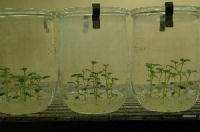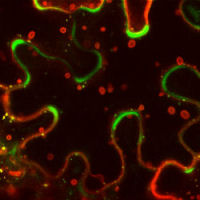Group
On this page...

Potatoes are well known to produce large quantities of food in a short period of time and using limited soil surface. Consequently, introduction of potatoes in Europe was accompanied by significant population growth. In developed countries with temperate climate, yields in excess of 50 tons per hectar during just 5 months growth are regularly achieved and high starch varieties can contain up to 35% of starch per fresh-weight. In addition, digestion of starch to fermentable sugars is very straightforward compared to the almost impossible task of converting complex plant cell wall polysaccharides to fermentable sugar. Due to the short growing period, potatoes are excellent for standard crop rotation practices, which is essential for sustainable production. To place things into perspective, the annual Chinese corn consumption is currently 144.5 million tons grown on 27.35 million hectares planted with corn (Source: China National Grain and Oils Information Center.). If this surface were used for high starch potato growth and optimal yields are envisaged, it would yield 1367.5 million tons potatoes, containing 478 million tons of starch, yielding approximately 200 million tonnes of alcohol after complete saccharification and alcohol fermentation. With a world-wide mineral oil production of 24,962,000,000 barrels per annum, yielding approximately 4000 million tonnes of crude oil and approximately 2000 million tonnes of petrol after fractionated distillation, the Chinese corn-fields alone could replace 7% of the worldwide petrol production (alcohol has 70% of the energy content of the same volume of petrol). In spite of these features, potatoes are not considered as energy crops and world-wide production is merely 293 million tons / 18 million hectares, making no impact at all in the energy sector. Reasons for this are 1) lack of popularity of potatoes compared to cereals (bread, pasta, rice, corn), 2) the fact that potatoes are considered a high cost crop, and 3) the expense associated with enzymatic saccarification. The aim of my project is to tackle the third and probably most severe argument against potatoes and to explore if self-mating potatoes could turn the tide.
My work involves genetic engineering of potatoes to contain a set of hydrolases (α-amylase, ß-amylase and glucoamylase) hidden in a separate cell compartment as the starch.
 |
 |
2007- |
PhD in Biology - Faculty of Biological Sciences, The University of Leeds, U.K. Project title: “Self-malting potatoes”. Supervisor Dr. Jürgen Denecke |
2003-2007 |
BSc University of Leeds |
 Contact
ContactUniversity of Leeds -
Faculty of Biological Sciences
L C Miall Building -
Room 9.13-9.14
Clarendon Way
Leeds -
LS2 9JT
0113 3437031
bmb3j2a@leeds.ac.uk
owner = 'Jurgen Denecke'; $page->foot(); ?>